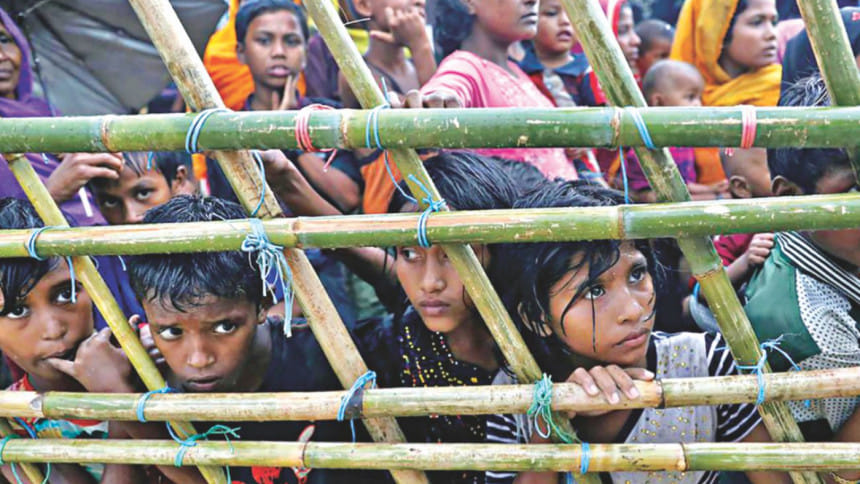From Transition to Transformation

Choices of transitional justice mechanisms have to be sensitive to the practical limits of justice in a society transitioning from military rule to democracy. And in this process, truth commissions, reparation policies and guarantees of non-repetition hold greater promise.
The world's fastest growing refugee crisis may seem to be poised for an accelerated resolution as prominent actors in the international community are rallying for the repatriation of the Rohingya. Many have viewed repatriation as a stepping-stone for the broad systemic transformation envisaged in the recommendations of the Kofi Annan Foundation. Notable among the proponents of repatriation is the Vice President of the European Commission, Federica Mogherini, who recently conveyed to Myanmar's State Councilor Aung Saan Suu Kyi the EU's decision to collaborate in Rohingya repatriation. Bangladesh has also welcomed the prospect of repatriation and talks are underway to commence the process. However, this somewhat self-serving idealism on part of the international community must be tested for its prudence, as the fate of the Rohingya swings precariously in the balance.
The proposed framework for repatriation is yet to be revealed. However, what is crucial to emphasise is that any scheme for repatriation must be integrated into a broader transitional justice process. Accountability and reparation for atrocities are vital prerequisites for sustainable peace. While the Burmese army has initiated an inquiry into the military operations in Rakhine State, this cannot be accepted as a genuine effort to reveal the truth of the Rohingya's plight. There is a need for a truth-telling process conducted by an impartial truth commission, accountability mechanisms for those responsible for the atrocities and a reparation policy for victims. There is no automatic nexus between repatriation and gradual realisation of the transformative goals set by the Kofi Annan Foundation. Transformation must be mediated and facilitated by a carefully designed agenda for transitional justice.
Myanmar's transition to democracy is at a delicate stage of development. The complexities encountered in transitional societies surrounding choices between stability and justice are particularly problematic here. For peace to be genuine and sustainable, a rigorous evaluation of available options will be necessary in order to synthesise a set of transitional justice processes and mechanisms that can deliver justice without severely destabilising the democratisation process. Conferring a civic identity on the Rohingya is, of course, vital to the furtherance of the aim of justice. Other aims of transitional justice, however, will need to be located within the uncertain dynamics of Myanmar's politics.
It is clear that Suu Kyi's position is precarious. Her reticence may be explained as a strategic measure given the fragile balance of powers in Myanmar, wherein the military continues to maintain a stronghold on core governmental processes. Hence, choices of transitional justice mechanisms have to be sensitive to the practical limits of justice in a society transitioning from military rule to democracy. And in this process, truth commissions, reparation policies and guarantees of non-repetition hold greater promise.
Of course, Myanmar's intractable denial of military involvement poses problems for the establishment of a truth commission. There is scope to reflect on the experiences of Colombia and Peru in this regard. In Colombia there was no truth commission preceding the reparation policy. On the other hand, truth-telling can raise unrealistic expectations which reparation policies cannot meet, as in Peru. However, it is worth asking whether reparations alone can deliver a sense of justice. Moreover, rebuilding the relationship between the Rohingya as citizens of Myanmar and the State of Myanmar demands the truth of the past to be acknowledged.
In the context of reparation, any policy must extend beyond individual outcomes of vindication, recognition and wellbeing and create a climate conducive to the full implementation of the Foundation's recommendations. It must deliver social outcomes including cohesion, reconciliation and social trust, as well as political and economic outcomes that eradicate the prevalent systematic marginalization and structural violence against the Rohingya.
An agenda for sustainable peace must be furthered because as delicate as the political order is in Myanmar, there is no political gridlock that obviates progress. Repatriation alone is certainly not a panacea for the crisis at hand. It is incumbent upon the international community to ensure that repatriation is integrated into a broader framework for the delivery of transitional justice, notwithstanding the risk of destabilisation. We cannot be so enamored of the notion of stability that we become blind to its reality as the perpetuation of injustice with impunity. It is a trial for the conscience of all nations and a test of the merits of our claim to civilisation, in how we discharge our duties as custodians of a religious and ethnic collective.
The writer is a student of Human Rights and Transitional Justice at the Transitional Justice Institute, Ulster University, UK.

 For all latest news, follow The Daily Star's Google News channel.
For all latest news, follow The Daily Star's Google News channel. 



Comments